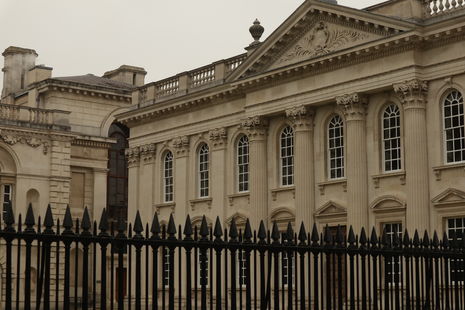Confidence isn’t earned, it’s bought
Amelie Rothwell explores the reasons behind the confidence gap between private and state school students at Cambridge

Although Cambridge may now boast 71% state school admissions, gaps in confidence between private and state school students, created by lifelong disparities of opportunity and resources, do not simply evaporate on matriculation day. When these students arrive with such different experiences in their formative years, it is no surprise that the former tend to speak with much more authority than the latter.
Before coming to Cambridge, I, like many of you I’m sure, was told “it feels just as daunting for everyone,” but I quickly learned otherwise. Some were simply more prepared than others. Whilst supervisions were home away from home for my private school counterparts, used to close attention and debating, they were foreign to me. The intense style of teaching was a world away from large state school classes, often 30 plus children to one exhausted teacher who could barely remember your name. Therefore, for those of us used to that often-invisible feeling, verbalising our opinions with confidence and fluency was a skill we had to learn here, not one we came with.
“When resources are stripped bare, such subjects become luxuries”
It is not as if private school children are taught from year one that they are inherently superior, although the likes of Boris Johnson might make it seem as such. The point is, they do not need to be. A private school education fosters a level of self-belief that you simply do not get in a state school. Smaller class sizes, with a fundamental emphasis on the individual rather than the collective, creates fertile ground for students to be heard and encouraged. This is an environment that comes with implicit assumptions: you will succeed and be given all the tools to do so.
Last year, I took an ancient history paper and while every week I dreaded having to mumble through any Latin words, my supervision partner, who had classics lessons at school, eloquently recounted them. Ultimately, this is what parents are paying for: not just top grades but the promise of cultural fluency facilitated by a bespoke curriculum. Such an education is taught to avoid embarrassment at high society dinners or indeed, during Oxbridge supervisions. In contrast, decades of austerity have left our state schools with no choice but to place an emphasis on passing rather than excelling. Who needs Latin when the priority is ensuring as many people as possible are passing maths and English?
When resources are stripped bare, such subjects become luxuries. But possibly the most damaging consequence of an education system desperately trying to keep its head above water is that students who are struggling sink. When teachers are overworked and resources overstretched, neurodivergent conditions like ADHD and dyslexia go fatefully unnoticed while diagnosed and accommodated in private schools – a fact underlined by the controversial Ofqual findings that 43% qualify for extra time compared to 26.5% at state school. One can only begin to imagine the psychological impacts that being undiagnosed goes on to have. How many never made it to Cambridge, or went on to doubt their ability, because years of unnoticed struggle prevented them from reaching their potential? For that reason, Cambridge or any institution where entry is based on exams, cannot truly claim to welcome difference until neurodivergence is equally diagnosed and accommodated in state schools.
Beyond academics, I have observed how the school you went to dictates the social capital you bring to university. Longer days and better resources at private schools enable a larger emphasis on extracurriculars with students often learning to play high level music and sports. This opens doors at Cambridge such as going on fully funded tours with your college choir or competing at Varsity level in sports like rugby and lacrosse. These opportunities provide students with a sense of purpose, a built-in community and may well improve their mental health. While Cambridge stresses anyone can get involved, the point is it’s difficult to leverage skills in the same way when you’re 15 years behind.
“The school you went to dictates the social capital you bring to university”
The Cambassador scheme, set up in 2019, aims to mitigate disadvantages in the education system through outreach events, often employing existing Cambridge students from state school backgrounds. However, whilst doing vital work, university outreach programmes effectively address the symptoms, not the cause: the deep-seated inequalities within the education system itself. The persisting disadvantage in the job sector suggests a state education is a lifelong tax. Even when graduating from the same university with the same grade, a recent study by the Institute of Fiscal studies found state schoolers are statistically less likely to be employed than their privately educated peers. Following this, the study insisted that further research is needed on causes, investigating social network factors but also psychological ones like self-belief.
Ultimately, the advantages of a private education go beyond a stellar university application, providing lifelong advantages in confidence and self belief. Universities can try to mitigate this, but no amount of quotas or targets can level a playing field that has been rigged since childhood. The truth is, the confidence gap exists because, when opportunity and social capital dictate a student’s self worth, confidence isn’t earned, it’s bought. Considering these inequalities will continue as long as private schools exist and state schools remain chronically underfunded, a fundamental change to our U18 education system is necessary. Therefore, if we want further progress, we should be looking to the government, not the University.
 News / Colleges charge different rents for the same Castle Street accommodation2 March 2026
News / Colleges charge different rents for the same Castle Street accommodation2 March 2026 News / News in Brief: waterworks, wine woes, and workplace wins 1 March 2026
News / News in Brief: waterworks, wine woes, and workplace wins 1 March 2026 News / Climate activists protest for ‘ethical careers policy’1 March 2026
News / Climate activists protest for ‘ethical careers policy’1 March 2026 News / Angela Merkel among Cambridge honorary degree nominees27 February 2026
News / Angela Merkel among Cambridge honorary degree nominees27 February 2026 News / Private school teacher who lied about Cambridge degree barred from teaching27 February 2026
News / Private school teacher who lied about Cambridge degree barred from teaching27 February 2026









